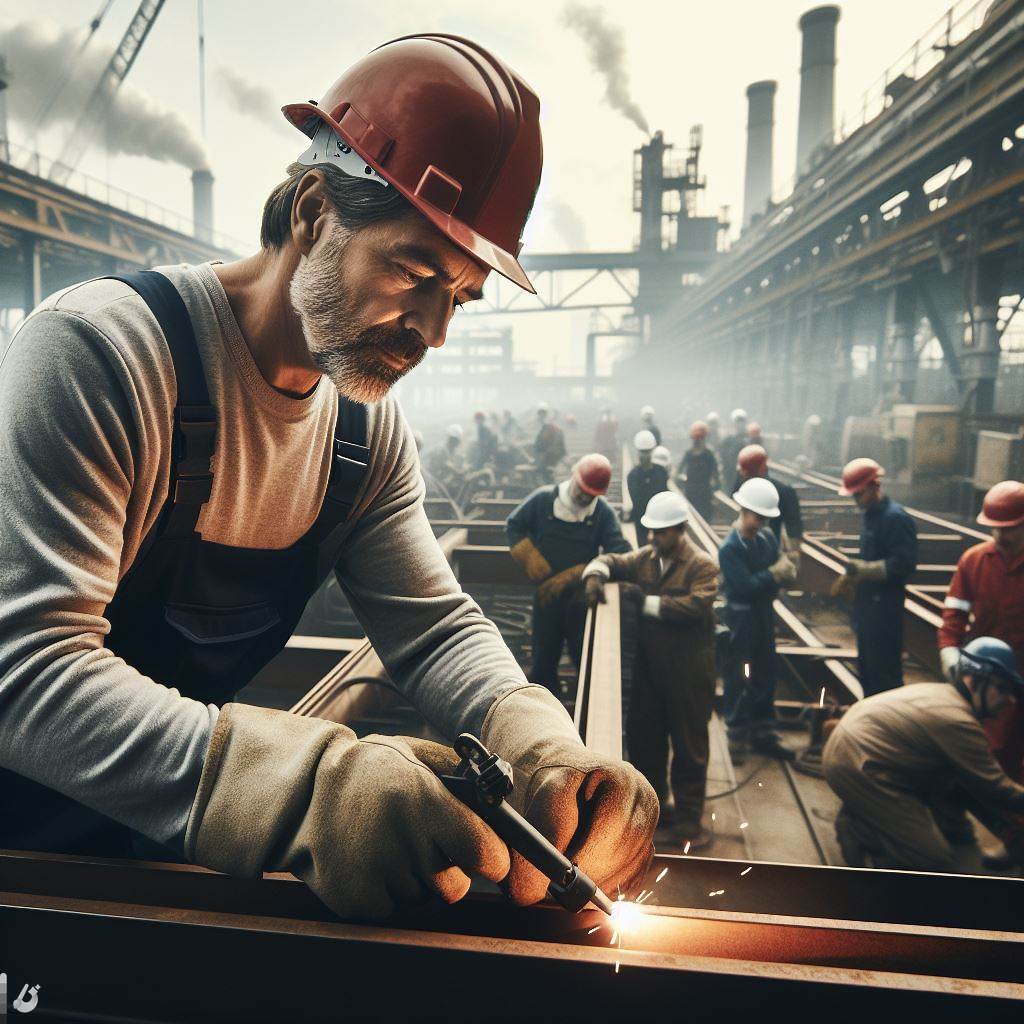Introduction
Skills play a crucial role in the construction industry as they directly impact the quality of work and project success.
From technical expertise to soft skills, construction workers must possess a diverse set of abilities to excel in their roles.
This blog post will delve into the top skills that every construction worker must have to thrive in their profession.
We will discuss both technical skills, such as proficiency in reading blueprints and operating machinery, as well as essential soft skills, like communication and problem-solving abilities.
By focusing on these skills, construction workers can enhance their employability and contribute to the success of construction projects.
In short, possessing a diverse range of skills is crucial for every construction worker.
Technical expertise combined with strong soft skills empowers construction workers to deliver high-quality projects on time and within budget.
By continuously developing these skills, construction workers can remain competitive in the ever-evolving construction industry.
Essential technical skills for construction workers
A construction worker requires a set of essential technical skills to excel in their job.
These skills enable them to navigate the complexities of their work and contribute to the successful completion of construction projects.
Some of the crucial technical skills for construction workers include:
Knowledge of construction materials and tools
- Understanding different types of construction materials, such as wood, concrete, steel, and their uses.
- Familiarity with various construction tools, including hand tools, power tools, and heavy machinery.
- Ability to select appropriate materials and tools based on the nature of the construction project.
- Knowledge of safety precautions while handling construction materials and tools.
Reading and interpreting blueprints
- Proficiency in reading and understanding construction blueprints, diagrams, and technical specifications.
- Capability to interpret architectural and engineering drawings to carry out construction tasks.
- Skilled in identifying dimensions, measurements, and symbols on blueprints accurately.
- Ability to translate blueprints into actionable construction plans.
Proficiency in using construction equipment
- Expertise in operating and maintaining a wide range of construction equipment and machinery.
- Knowledge of safety protocols and best practices while utilizing construction equipment.
- Ability to troubleshoot and resolve minor technical issues with construction equipment.
- Capability to evaluate equipment performance and make adjustments as needed.
Basic understanding of electrical and plumbing systems
- Basic knowledge of electrical systems, including wiring, power distribution, and electrical codes.
- Familiarity with plumbing systems, fixtures, piping, and plumbing regulations.
- Ability to identify and troubleshoot common electrical and plumbing issues.
- Understanding of safety measures related to electrical and plumbing work.
In fact, construction workers need to possess essential technical skills to excel in their profession.
A solid understanding of construction materials and tools, the ability to read and interpret blueprints, proficiency in using construction equipment, and a basic understanding of electrical and plumbing systems are all crucial for success in the construction industry.
Read: Pipeline Welding in Canada: Challenges & Rewards
Physical skills required in construction work
A construction worker needs to possess various physical skills to excel in their job.
These skills not only ensure their safety but also contribute to the efficiency and quality of their work.
Here are some of the key physical skills every construction worker must have:
Physical strength and stamina
Construction work is physically demanding, requiring workers to lift heavy objects, move materials, and perform tasks that involve significant physical exertion.
Having substantial physical strength is crucial to perform these activities effectively and prevent injuries.
Additionally, construction work often involves long hours and challenging environmental conditions.
Therefore, construction workers must have the stamina to sustain their energy levels throughout the workday.
Manual dexterity and hand-eye coordination
Precision is essential in construction work, as workers often need to handle and manipulate various tools, materials, and equipment.
Manual dexterity, which refers to the ability to use precise finger movements, is vital for tasks such as handling small components, wiring, or plumbing.
Furthermore, hand-eye coordination plays a significant role in construction work since workers need to accurately operate machinery, handle power tools, drive nails, and perform other tasks that demand the synchronization of vision and hand movements.
Ability to work at heights
Construction sites often involve working at heights, whether on ladders, scaffolds, or elevated platforms.
Unlock Your Career Potential
Visualize a clear path to success with our tailored Career Consulting service. Personalized insights in just 1-3 days.
Get StartedTherefore, construction workers must possess the necessary skills to perform tasks in elevated positions while ensuring their safety and the safety of others.
This skill includes knowledge of proper safety procedures, maintaining balance, and using fall protection equipment, such as harnesses and safety nets.
The ability to work at heights ensures that construction workers can contribute to projects that require vertical construction.
Skills for operating heavy machinery
In many construction projects, heavy machinery is an integral part of the work process.
Construction workers must have the skills to operate machinery safely and efficiently to perform tasks such as digging, lifting, moving heavy materials, and operating specialized equipment.
The ability to operate heavy machinery requires technical knowledge, familiarity with equipment controls, and a keen understanding of safety protocols.
Proper training and certification are often necessary to ensure construction workers can handle machinery effectively.
In essence, physical skills form the foundation of a successful construction worker’s skill set.
Physical strength, stamina, manual dexterity, hand-eye coordination, the ability to work at heights, and skills in operating heavy machinery are all essential for a construction worker to perform their job effectively and safely.
By possessing these skills, construction workers can contribute to the successful completion of construction projects while ensuring their own well-being and the well-being of their team.
Read: Welding in Harsh Canadian Climates
Communication and teamwork skills in construction
Effective communication with supervisors, colleagues, and clients
- Clear and concise communication is crucial in construction to ensure everyone understands expectations.
- Workers should provide regular updates to supervisors and seek clarification on tasks when needed.
- Effective communication with colleagues fosters a positive work environment and enhances productivity.
- Being able to communicate effectively with clients helps to build trust and maintain good relationships.
Active listening and comprehension
- Active listening is an essential skill for construction workers to understand instructions accurately.
- Workers should give their full attention to speakers and seek clarification if they don’t understand something.
- Comprehending information correctly prevents errors and ensures tasks are completed correctly the first time.
- Active listening also shows respect and encourages effective teamwork among colleagues.
Strong teamwork and collaboration abilities
- Construction projects often involve multiple workers, so teamwork and collaboration are vital.
- Workers should be willing to contribute ideas and work together to solve problems.
- Building strong relationships with colleagues leads to better cooperation and overall project success.
- Being a team player includes offering support, sharing knowledge, and helping others when needed.
Conflict resolution skills
- In a construction setting, conflicts may arise due to differing opinions or misunderstandings.
- Workers should have the ability to resolve conflicts in a professional and constructive manner.
- Active listening, empathy, and compromise are key skills in conflict resolution.
- Resolving conflicts promptly and effectively minimizes disruptions and maintains a positive work environment.
Effective communication and strong teamwork are fundamental skills for construction workers.
By communicating effectively with supervisors, colleagues, and clients, construction workers ensure clarity, productivity, and successful project outcomes.
Active listening and comprehension skills enable workers to understand instructions accurately and minimize errors.
In addition, strong teamwork and collaboration abilities foster a positive work environment and encourage innovation and problem-solving.
Conflict resolution skills are also essential to address disagreements constructively, maintaining a harmonious atmosphere on construction sites.
Overall, honing these communication and teamwork skills enhances construction workers’ professionalism, efficiency, and success in the industry.
Read: Exploring the Art of Sculptural Welding
Time Management and Organization Skills for Construction Workers
A construction worker’s success greatly relies on their ability to manage time effectively and stay organized.
This section will explore the importance of time management and organization skills in the construction industry.
Efficient Planning and Prioritization of Tasks
- Construction workers must be skilled at creating detailed plans to ensure smooth project execution.
- Efficient planning allows workers to identify critical tasks and allocate resources accordingly.
- By breaking down projects into smaller tasks, construction workers can prioritize and tackle them systematically.
- Proper planning helps workers avoid unnecessary delays and boosts overall productivity on the construction site.
- Effective prioritization ensures that important tasks are completed first, minimizing potential setbacks.
Ability to Meet Project Deadlines
- Construction workers must have a strong sense of time and strive to meet project deadlines.
- Meeting deadlines is crucial in maintaining client satisfaction and building a positive reputation.
- Workers must understand the scope of work and allocate time accordingly for each task.
- They need to be proactive in identifying any potential obstacles that may hinder timely completion.
- With proper time management, workers can effectively allocate resources and adjust schedules if necessary.
Organization of Materials, Tools, and Workspaces
- Proper organization of materials is essential to ensure efficient workflow on construction sites.
- Construction workers must have a systematic approach to storing and accessing materials.
- Maintaining an inventory system helps prevent delays caused by missing or misplaced materials.
- Organizing tools and equipment ensures easy accessibility and minimizes time wasted searching for resources.
- Workspaces should be kept clean and clutter-free for optimal productivity and safety.
Construction workers can develop and enhance their time management and organization skills through various strategies.
- Using digital tools such as project management software and calendar applications can aid in planning and scheduling tasks.
- Creating to-do lists and setting realistic deadlines helps in prioritizing and tracking progress.
- Regularly reviewing and adjusting plans based on changing project requirements and timelines is crucial.
- Clear communication and coordination with team members facilitate effective time management and organization.
- Implementing proper storage systems and labeling materials and equipment contribute to efficient organization.
In general, time management and organization skills play a vital role in the success of construction workers.
Efficient planning, meeting project deadlines, and organizing materials and workspaces contribute to increased productivity and client satisfaction.
By continuously improving these skills, construction workers can excel in their roles and contribute to successful construction projects.
Read: Marine Welding Opportunities in Canada

Adaptability and Problem-Solving Skills in the Construction Industry
A construction worker must possess various skills to excel in the dynamic environment of the construction industry.
In addition to technical expertise, two vital skills that every construction worker must have are adaptability and problem-solving abilities.
In this section, we will explore the significance of these skills and their impact on a construction worker’s success.
Ability to Adapt to Changing Work Conditions and Environments
- Construction sites are known for their unpredictable nature, with changes in weather, project specifications, and unforeseen challenges.
- A construction worker must be flexible and open to adapting quickly to new circumstances to ensure work continuity.
- Adaptability allows construction workers to adjust their approach and methods to effectively tackle evolving conditions.
- Workers who can adapt are better equipped to handle unexpected situations and maintain productivity levels.
- Moreover, an adaptable construction worker becomes an invaluable asset, constantly sought after by employers.
Critical Thinking to Solve Unexpected Issues That May Arise
- The construction industry presents numerous complex problems that require prompt resolutions.
- Construction workers with strong critical thinking skills can analyze situations and identify viable solutions.
- They are adept at evaluating risks, understanding project scope, and devising effective strategies to overcome challenges.
- When faced with unexpected issues, problem-solving skills enable construction workers to think creatively and find practical solutions.
- Quick and efficient problem-solving minimizes project delays and ensures smooth construction operations.
Troubleshooting Skills to Identify and Fix Problems
- Construction projects often encounter technical difficulties that require troubleshooting expertise.
- Successful construction workers possess the ability to identify problems accurately and implement suitable solutions.
- They can investigate issues systematically, using their knowledge to diagnose malfunctions or faults.
- Once problems are identified, construction workers must apply their expertise to rectify the issues efficiently.
- The application of troubleshooting skills ensures that construction projects remain on track and defects are resolved promptly.
In brief, adaptability and problem-solving skills are indispensable for construction workers seeking success in the industry.
As work conditions and environments change constantly, workers must adapt quickly to maintain productivity.
Additionally, critical thinking enables them to find innovative solutions to unexpected problems, reducing project delays.
Finally, the ability to troubleshoot and fix issues ensures smooth construction operations.
By honing these skills, construction workers can enhance their value and contribute significantly to the success of construction projects.
Safety skills and knowledge for construction workers
Understanding and application of safety regulations
- Construction workers must have a thorough understanding of safety regulations.
- They need to be aware of the rules and guidelines that govern construction sites.
- By following safety regulations, workers can prevent accidents and maintain a safe working environment.
- Compliance with safety regulations also ensures legal compliance for both workers and employers.
- Workers should stay updated on changes to safety regulations to adapt their practices accordingly.
Proper handling and use of personal protective equipment
- Construction workers must know how to handle and use personal protective equipment (PPE) correctly.
- PPE includes items such as hard hats, safety goggles, gloves, and steel-toed boots.
- Workers should inspect their PPE regularly and ensure it is in good condition.
- Proper usage of PPE minimizes the risk of injury from falling objects, debris, chemicals, or tools.
- Workers should know the specific PPE requirements for different tasks and use them accordingly.
Awareness of potential hazards and ability to respond accordingly
- Construction workers need to be constantly aware of potential hazards present on construction sites.
- They should have the ability to identify possible risks and take appropriate actions to mitigate them.
- Workers should constantly scan their surroundings and report any hazardous conditions to their supervisors.
- They must follow established procedures for dealing with emergencies or accidents on the job.
- Regular safety trainings and communication with colleagues contribute to increased hazard awareness.
Safety skills and knowledge are essential for construction workers to protect themselves and others.
Understanding safety regulations, proper use of personal protective equipment, and hazard awareness are vital.
By prioritizing safety, construction workers can reduce accidents, injuries, and promote a culture of safety on construction sites.
Employers should provide training and resources to ensure workers have the necessary skills and knowledge to work safely.
Ultimately, a commitment to safety benefits everyone involved in the construction industry.
Training and Certification Requirements for Construction Workers
A construction worker’s job is physically demanding and requires a certain set of skills.
While some of these skills can be learned on the job, formal training and certifications are essential for professional growth and advancement.
In this section, we will explore the importance of ongoing training, the possibility of obtaining industry-specific certifications, and the benefits of continuous education in the construction industry.
Importance of Ongoing Training and Skills Development
- Continuous training helps construction workers enhance their skills and stay updated with industry advancements.
- Regular training sessions improve productivity, safety, and efficiency on construction sites.
- Ongoing training promotes career growth and provides opportunities for higher-paying positions.
- Construction workers who undergo regular training are more likely to deliver high-quality work.
- Improved skills obtained through training contribute to overall job satisfaction and personal fulfillment.
Possibility of Obtaining Industry-Specific Certifications
- Construction workers have the opportunity to obtain various certifications in their respective trades.
- Certifications, such as the OSHA 10-hour or 30-hour training, enhance safety awareness on construction sites.
- Industry-specific certifications validate a construction worker’s expertise and make them more employable.
- Certified workers often have an edge over non-certified individuals when competing for job opportunities.
- By obtaining certifications, construction workers demonstrate their commitment to professionalism and continuous improvement.
Benefits of Continuous Education and Staying Updated
- Continuous education allows construction workers to stay updated with new industry regulations and techniques.
- Staying informed about the latest tools and technologies helps workers remain competitive in the industry.
- Construction workers who prioritize continuous learning are better equipped to handle complex projects.
- Continuous education enhances problem-solving abilities and critical thinking skills.
- Regularly attending workshops and seminars fosters networking opportunities with industry professionals.
- By staying updated, construction workers contribute to the overall growth and innovation of the construction industry.
In a nutshell, training and certification requirements play a vital role in the development of construction workers.
Ongoing training improves skills, productivity, and overall job satisfaction. Industry-specific certifications add value to a construction worker’s resume and enhance their career prospects.
Continuous education ensures workers stay up-to-date with industry advancements and enables them to tackle complex projects.
It is clear that investing in training and certifications is crucial for both personal and professional growth in the construction industry.
Conclusion
In the fast-paced world of construction, mastering crucial skills is non-negotiable.
Effective construction workers possess:
- Physical Endurance: Sustaining energy for demanding tasks ensures productivity.
- Technical Proficiency: Mastery of tools and machinery guarantees precision and safety.
- Communication Skills: Seamless collaboration enhances teamwork and project efficiency.
- Problem-Solving Aptitude: Adapting to unforeseen challenges is a hallmark of a skilled worker.
- Attention to Detail: Precision in measurements and execution maintains quality standards.
- Time Management: Meeting deadlines showcases reliability and professionalism.
To budding construction enthusiasts: invest time and effort in honing these skills.
They are the stepping stones to a rewarding career in construction, offering opportunities for growth and accomplishment.
Mastering these skills ensures not just survival, but thriving in the construction industry.
They’re the cornerstone of success and catapult your career to new heights. Your commitment to continuous improvement will be your greatest asset.




